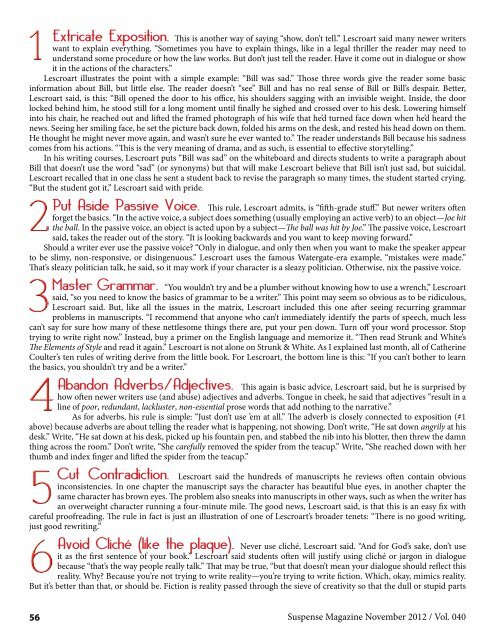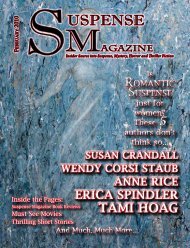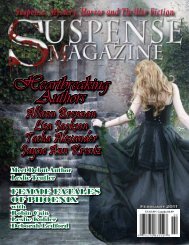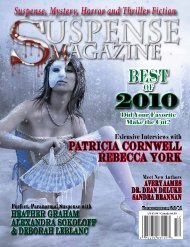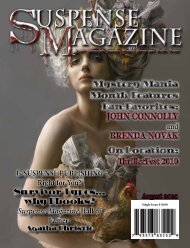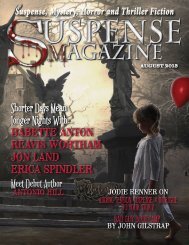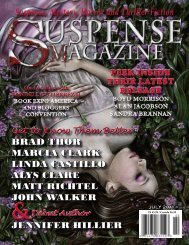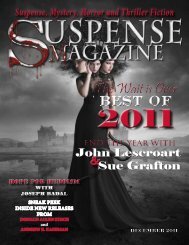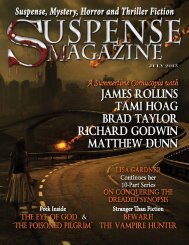Create successful ePaper yourself
Turn your PDF publications into a flip-book with our unique Google optimized e-Paper software.
Extricate Exposition. This is another way of saying “show, don’t tell.” Lescroart said many newer writers<br />
want to explain everything. “Sometimes you have to explain things, like in a legal thriller the reader may need to<br />
understand some procedure or how the law works. But don’t just tell the reader. Have it come out in dialogue or show<br />
it in the actions of the characters.”<br />
Lescroart illustrates the point with a simple example: “Bill was sad.” Those three words give the reader some basic<br />
information about Bill, but little else. The reader doesn’t “see” Bill and has no real sense of Bill or Bill’s despair. Better,<br />
Lescroart said, is this: “Bill opened the door to his office, his shoulders sagging with an invisible weight. Inside, the door<br />
locked behind him, he stood still for a long moment until finally he sighed and crossed over to his desk. Lowering himself<br />
into his chair, he reached out and lifted the framed photograph of his wife that he’d turned face down when he’d heard the<br />
news. Seeing her smiling face, he set the picture back down, folded his arms on the desk, and rested his head down on them.<br />
He thought he might never move again, and wasn’t sure he ever wanted to.” The reader understands Bill because his sadness<br />
comes from his actions. “This is the very meaning of drama, and as such, is essential to effective storytelling.”<br />
In his writing courses, Lescroart puts “Bill was sad” on the whiteboard and directs students to write a paragraph about<br />
Bill that doesn’t use the word “sad” (or synonyms) but that will make Lescroart believe that Bill isn’t just sad, but suicidal.<br />
Lescroart recalled that in one class he sent a student back to revise the paragraph so many times, the student started crying.<br />
“But the student got it,” Lescroart said with pride.<br />
Put Aside Passive Voice. This rule, Lescroart admits, is “fifth-grade stuff.” But newer writers often<br />
forget the basics. “In the active voice, a subject does something (usually employing an active verb) to an object—Joe hit<br />
the ball. In the passive voice, an object is acted upon by a subject—The ball was hit by Joe.” The passive voice, Lescroart<br />
said, takes the reader out of the story. “It is looking backwards and you want to keep moving forward.”<br />
Should a writer ever use the passive voice “Only in dialogue, and only then when you want to make the speaker appear<br />
to be slimy, non-responsive, or disingenuous.” Lescroart uses the famous Watergate-era example, “mistakes were made.”<br />
That’s sleazy politician talk, he said, so it may work if your character is a sleazy politician. Otherwise, nix the passive voice.<br />
Master Grammar. “You wouldn’t try and be a plumber without knowing how to use a wrench,” Lescroart<br />
said, “so you need to know the basics of grammar to be a writer.” This point may seem so obvious as to be ridiculous,<br />
Lescroart said. But, like all the issues in the matrix, Lescroart included this one after seeing recurring grammar<br />
problems in manuscripts. “I recommend that anyone who can’t immediately identify the parts of speech, much less<br />
can’t say for sure how many of these nettlesome things there are, put your pen down. Turn off your word processor. Stop<br />
trying to write right now.” Instead, buy a primer on the English language and memorize it. “Then read Strunk and White’s<br />
The Elements of Style and read it again.” Lescroart is not alone on Strunk & White. As I explained last month, all of Catherine<br />
Coulter’s ten rules of writing derive from the little book. For Lescroart, the bottom line is this: “If you can’t bother to learn<br />
the basics, you shouldn’t try and be a writer.”<br />
Abandon Adverbs/Adjectives. This again is basic advice, Lescroart said, but he is surprised by<br />
how often newer writers use (and abuse) adjectives and adverbs. Tongue in cheek, he said that adjectives “result in a<br />
line of poor, redundant, lackluster, non-essential prose words that add nothing to the narrative.”<br />
As for adverbs, his rule is simple: “Just don’t use ’em at all.” The adverb is closely connected to exposition (#1<br />
above) because adverbs are about telling the reader what is happening, not showing. Don’t write, “He sat down angrily at his<br />
desk.” Write, “He sat down at his desk, picked up his fountain pen, and stabbed the nib into his blotter, then threw the damn<br />
thing across the room.” Don’t write, “She carefully removed the spider from the teacup.” Write, “She reached down with her<br />
thumb and index finger and lifted the spider from the teacup.”<br />
Cut Contradiction. Lescroart said the hundreds of manuscripts he reviews often contain obvious<br />
inconsistencies. In one chapter the manuscript says the character has beautiful blue eyes, in another chapter the<br />
same character has brown eyes. The problem also sneaks into manuscripts in other ways, such as when the writer has<br />
an overweight character running a four-minute mile. The good news, Lescroart said, is that this is an easy fix with<br />
careful proofreading. The rule in fact is just an illustration of one of Lescroart’s broader tenets: “There is no good writing,<br />
just good rewriting.”<br />
Avoid Cliché (like the plague). Never use cliché, Lescroart said. “And for God’s sake, don’t use<br />
it as the first sentence of your book.” Lescroart said students often will justify using cliché or jargon in dialogue<br />
because “that’s the way people really talk.” That may be true, “but that doesn’t mean your dialogue should reflect this<br />
reality. Why Because you’re not trying to write reality—you’re trying to write fiction. Which, okay, mimics reality.<br />
But it’s better than that, or should be. Fiction is reality passed through the sieve of creativity so that the dull or stupid parts<br />
56 <strong>Suspense</strong> <strong>Magazine</strong> <strong>November</strong> <strong>2012</strong> / Vol. 040


